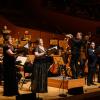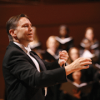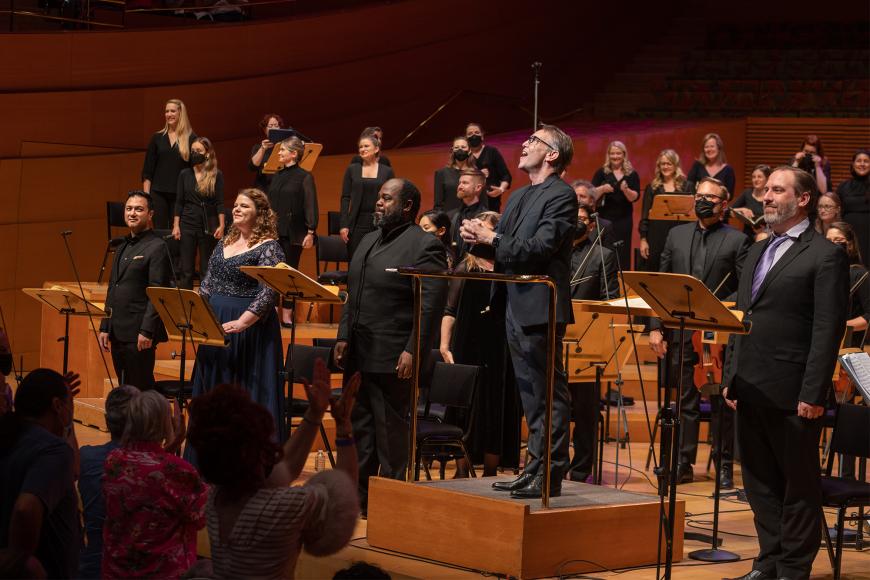
Lord have mercy on musicians emerging from lockdown to play colossally demanding works that have, through the darkness, sustained us in myriad recordings and ever fonder memories, honing our minds’ ears and whetting our appetites for a perfection unattainable in even the best of times.
Los Angeles Master Chorale and Musica Angelica Baroque Orchestra closed their seasons this weekend at Disney Hall with no less than Bach’s B Minor Mass. That the Saturday audience leapt to its feet in rapturous applause before the final “pacem” faded into peace is a testament to the indispensable service of live performance, of grappling with greatness in the flesh. Let this fundamental affirmation stand strong and clear as the Credo that opens the Mass’s second half.
Yet, between recent press plaudits and the group’s Grammy-awarded tour-de-force in Mahler’s Eighth Symphony, LAMC’s reputation led me to expect more, or at least different. A faint pallor seemed to hang over much of the performance. Pandemic fatigue? Insufficient rehearsal? Acoustic limitations? Or a matter of interpretation and style?
I confess to being one of those whose impulse runs to comparisons with recordings by Gardiner, Herreweghe, Koopman, and Suzuki, but I am not a dogmatic purist for historic “authenticity.” Here I wondered if a modern symphonic orchestra might have better served the occasion and allowed LAMC to sing out more.
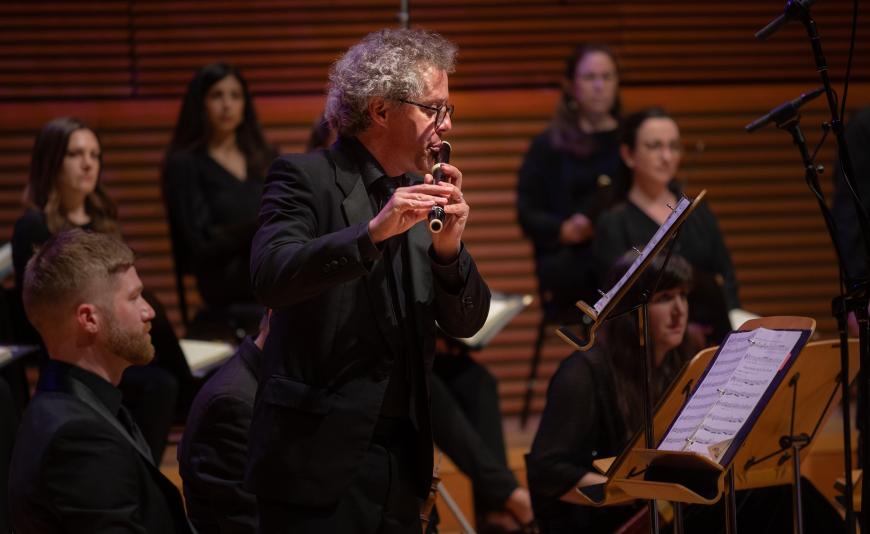
A hall engineered to favor the magnificence of the Los Angeles Philharmonic inevitably bleeds choral and gut-strung chamber ensembles of the full-flourishing vibrancy they would inhabit with native ease in a traditional church setting. At 47 singers to 27 instrumentalists, LAMC often seemed to be holding back for balance, while Musica Angelica strove heroically to meet a choir larger by at least a third than what early-music orchestras of its size usually face.
Within these constraints, LAMC Artistic Director Grant Gershon led a performance inclined toward a gentle mournfulness. Here was not a monument to be scaled, but a soft shroud in which to wrap oneself. The Kyrie sounded more like a sigh than a plea. “Qui tollis” languished lethargically in the gray-downy embrace of mild depression.
“Cum sancto spiritu” rallied spirits in time for a more vigorous start to the second half. The Credo perked up with a pulse that made the tender, dirgeful descent of despair through “Et incarnatus est” and “Crucifixus” all the more evocative. Had there been starker contrast with what preceded in the first half, the effect could have been harrowing. That said, “et homo factus est” perfectly embodied the holy mystery of emergence from nothingness into corporeal being, and the haunting opening to “Et expecto” set hallowed ground from which fanfare sprung celebratory enough to resurrect any.
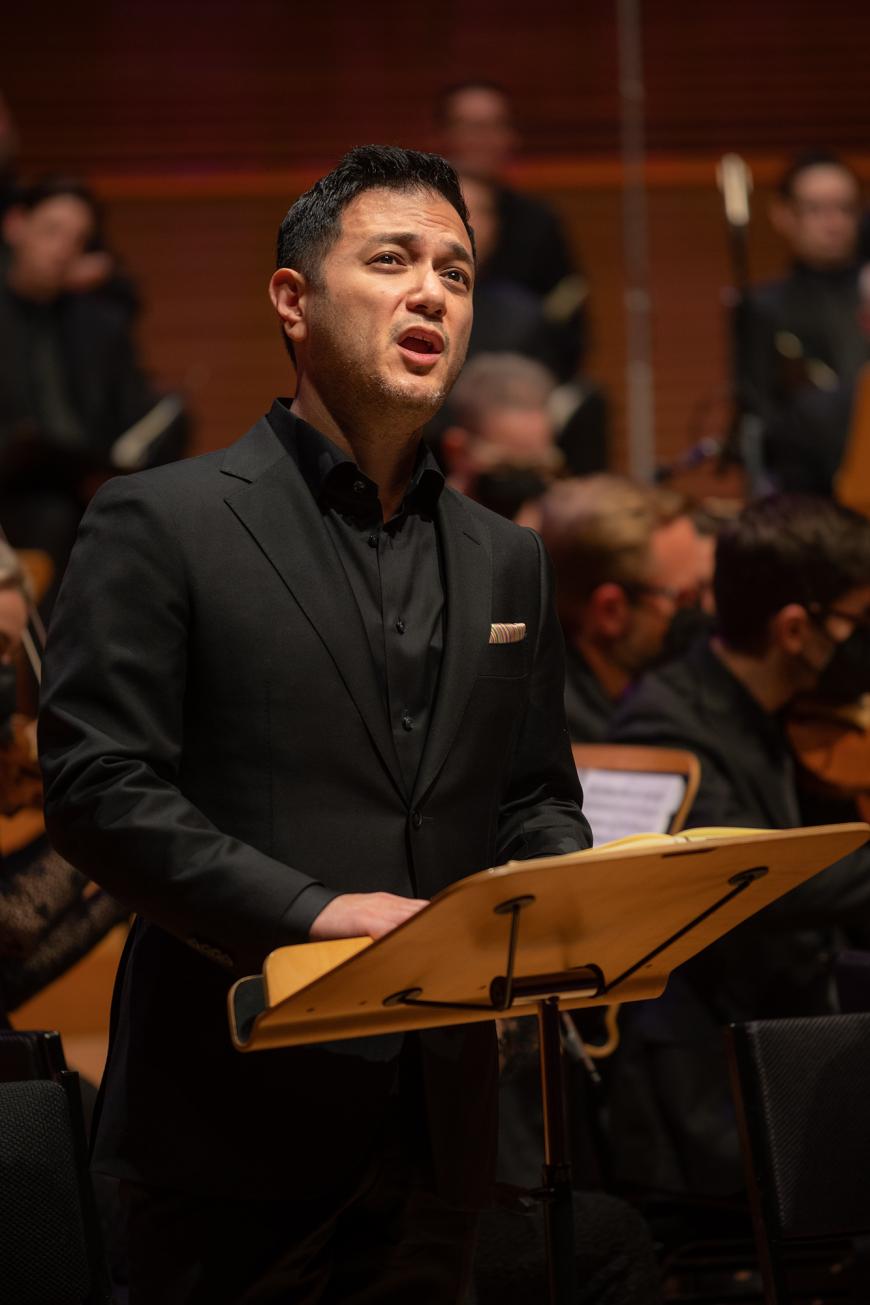
Soprano Julia Metzler rang a warm, rounded, almost mezzo tone, buoyant and unlabored. Bass Steve Pence presented a smooth gravity where others might blast stentorian. Despite sounding somewhat subdued compared to what I recall of their before-times brilliance elsewhere, countertenor Reginald Mobley and tenor Nicholas Phan both brought greater heft than their colleagues, causing slight imbalance in duets with Metzler and between arias across the concert. Phan’s voice has developed a muscular thrust and tension, more searing than soaring, since I last heard him live in 2019. Mobley still blossoms like an infinitely unfurling peony and does not fail to fold in a few sly ornamentations to delight fans who expect something new from him at every performance. But for the exception of a natural horn whose struggles cast a tragicomic light on “Quoniam tu solus sanctus,” instrumental soloists all rendered laudable service, duly obliging in their obbligato and continuo parts.
Neither transformative nor definitive, LAMC’s Mass nonetheless served a salve for times perhaps too defined by transformation. The final prayer for peace to cap Bach’s ultimate career-encompassing choral masterpiece rings eternal — “Dona nobis pacem” — and every iteration is a grace for which to be grateful.


